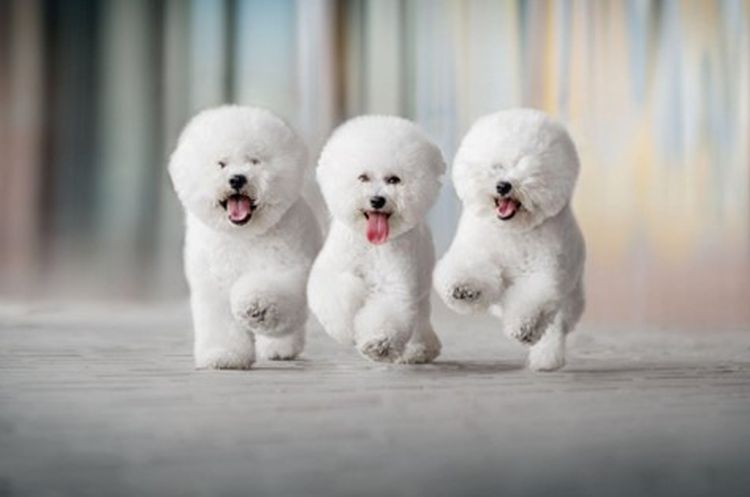
The Bichon Frise is a small, non-sporting dog breed which has an ancient Mediterranean ancestry. It is a descendant of the Barbet or the Water Spaniel from which the name Barbichon came from and was shortened to Bichon.
Due to its fun and friendly nature, the Bichon Frise breed became a favorite of the French royalties and Italian nobilities. It was also favored by the Infantas which were the sons and daughters of the Iberian kingdoms of Spain.
Contents
How Much to Pay for a Bichon Frise
The Bichon Frise cost will depend on where you are as demand, popularity, and availability differ between places. Additionally, what age you purchase the dog and the lineage will play a role.
The Bichon Frise typically will cost anywhere in the range of $250 to $2,500. The typical puppy with a pure and strong lineage will be in the $600 to $1,000 range as seen through AKC.
Higher prices will be fetched by show dogs and generally, the younger the puppy, the more expensive it will be. 2-month-old Bichon puppies tend to be closer to $1,000 in price.

If you want to avoid the inconveniences of rearing a puppy, you might want to consider adopting a dog from an animal rescue or breed rescue organization. An adult dog might already have some training; therefore, there will be less chaos around the house.
From a shelter, of course, we can expect to pay much less. It is somewhat rare to find a Bichon in a shelter environment and it will likely not be a pure breed. The cost of Bichon Frise from these facilities can cost in the $200 to $400 range.
What are Included in the Price?
Reputable breeders will provide you with the following:
- Health screening performed on the sire and dam
- Health guarantee of the puppy
- A written bill of sale which specifies the responsibilities of the buyer and the seller
- Limited registration form
- Pedigree
- Veterinarian examination
- Current vaccinations and deworming records
- Microchip implant
- Puppy food
In addition, the breeder might provide you with a health clearance from the Orthopedic Foundation for Animals (OFA) for hip dysplasia, elbow dysplasia, hypothyroidism, and von Willebrand’s disease. Other health clearances will come from Auburn University for thrombopathia and an eye certification from the Canine Eye Registry Foundation (CERF).
Some breeders offer promotional items, e.g., a travel crate with food/water bowl and toys, but these must be purchased separately.
If the puppy is to be shipped by air, the breeder will provide a shipping crate and will make all necessary arrangements for shipping. The buyer will shoulder this shipping cost which is excluded from the price of the puppy.
What Else to Spend on Upfront?
In addition to the Bichon Frise price, you also have to include the following initial expenses in raising or caring your pet:
- Shelter Costs
A Bichon Frise puppy needs a place to play, eat, and sleep. You will probably need a pet bed, a pet gate, a pet pen, and a dog carrier or crate.
A good doggie bed provides comfort and insulation from the temperature of the floor when it sleeps. A small size (23¾”L x 16¾”W) doggie bed costs around $20 and a medium size (29¾”L x 18¾”W) costs $30 on average.
Pet gates secure your dog in a room that provides a safe environment but you have to check on it once in a while. Depending on the size and material, the prices of pet gates range from $40 to $330.
If you are busy and unable to watch over your dog, pet pens/playpens/exercise pens can hold it while you’re doing other things. These items cost $30 up to over $100.
Dog carriers or crates are indispensable when housetraining your canines and in transporting them. Dog carriers cost $30 on average. Dog crates cost $20 up to $90.
If you live in a suburb, your home should have a fence to prevent your puppy to go astray.
Cost of Maintaining A Bichon Frise
- Food Costs
Generally, it’s recommended to feed Bichons about 300 to over 600 calories a day, depending on their weight. This would result in monthly food costs of roughly $40 to $80.
The Bichon Frise is a very small dog that typically weighs between 10 and 20 pounds. Although it is small in stature, it tends to have high energy levels, so its caloric intake needs to be appropriate to match its needs.
Bichon Frise puppies with ages from 6 to12 weeks require four feedings in a day. A cup of dog food should be divided into four portions.

Each 1/4 cup needs to be given every four to five hours. Unmoistened dry food is ideal. This will help them meet the nutritional needs for their rapid development.
When the puppies reach the age of 3 to 6 months, they require 3 small servings of puppy food in a day. At the age of 6 to 12 months, daily feeding should be divided into two meals.
Within this period, you may introduce adult dog food at 7 to 9 months. From 1 year onwards, adult can be feed with two half-portions daily.
- Hygiene and Grooming Costs
In terms of the cost of caring for Bichons, one of the main aspects of their maintenance is their coats. They have a two-layered coat which is very fine but requires frequent care to prevent knotting and other problems.
Brushing and combing should be ideally done daily and once monthly, grooming sessions are recommended. Most groomers charge $50 per session for a dog of this size.
- Training
Although Bichons are easy to train, they can be difficult to housetrain. For this reason, especially if adopting a puppy, you may seek professional help.
Obedience training can vary in price depending on whether it’s done in a group or privately. But on average, it will be about $50 per hour for private training up to around $120 to $200 per 6 sessions of group obedience training.
House training a Bichon Frise puppy can be accomplished using a crate. This will serve as a place for the puppy to sleep and eat. The puppy will be taken out of the crate whenever it is going to urinate or poop.
If you live in an area with difficult outdoor access, you can use a bathroom or an exercise pen in your home for house-training. If you will be using an exercise pen, you can use a litter box and a litter box filler to housetrain your pet. You may also use newspapers as wee-wee pads.
If your apartment has easy access to an outdoor yard, you have to use this as your primary toilet area. You also have to reward your pet with a treat every time he successfully finished his toilet training.
- Medical Costs
Medically speaking, there are a few concerns Bichon owners should keep in mind. One of these is that Bichons are susceptible to dental issues. These include early tooth loss and gum disease, so they should get regular dental exams at least once yearly and dental treats and tooth brushing if possible.
Dental exams can be part of regular check-ups which run around $50 and dental treats come fairly cheap at $10 to $20 per pack.
Like many small dogs, Bichons are also prone to hip dysplasia, where the joint becomes misaligned and the bones begin scraping against each other causing discomfort and lameness. Depending on when it is detected and the severity, surgery will almost always be needed and can cost anywhere from $1,200 to $6,000.
Patellar luxation or sliding kneecaps is another frequent Bichon medical issue. Again, surgery is needed to correct this and can run from $1,500 to $3,000, depending on the severity of the case and the size of the animal. Since Bichons are smaller, they will be at the lower end of the surgery cost.
Bichons are also susceptible to ear infections due to their long hair. This can be addressed by the regular and consistent grooming mentioned above.
Lastly, there is what’s called Kartagener’s Syndrome. This is a rare immune disorder that can occur among Bichons.
It causes chronic respiratory infections and requires antibiotic therapy to treat. This treatment is long term so it can cost upwards of $500 to $1,000 over the dog’s lifetime.
- Other Health-Related Costs
You might also want to consider spaying or neutering your dog since it can improve its health and temperament. The caninejournal.com says that spaying can prevent diseases such as uterine infections and breast cancer.
On the other hand, neutering can prevent testicular cancer. This will prevent it from marking your house with its urine. Spaying/neutering costs $50 to $200.
Vaccinating a pet dog is a must because it prevents illnesses. There are two types of dog vaccines; these are core and non-core vaccines.
Core vaccines prevent parvovirus, distemper, canine hepatitis and rabies. Non-core vaccines protect your dog from Bordetella bronchiseptica, Borrelia burgdorferi, and Leptospira bacteria.
The time and frequency of the administration of these vaccines will depend on your vet. The cost of vaccinations varies and not all vaccines should be given to the dog. Basic vaccinations can cost around $20 to $70.
